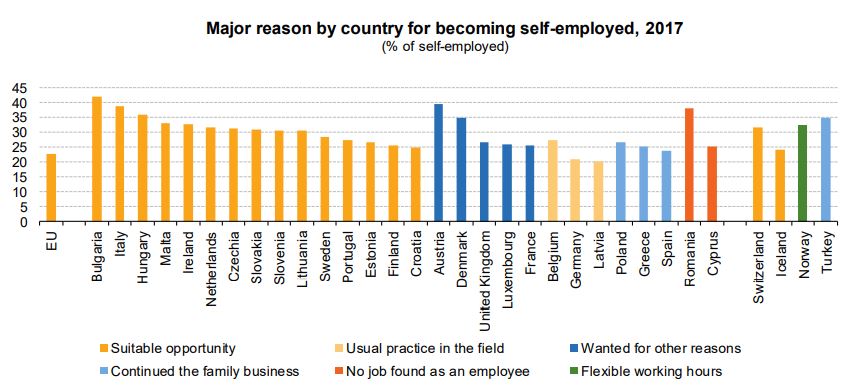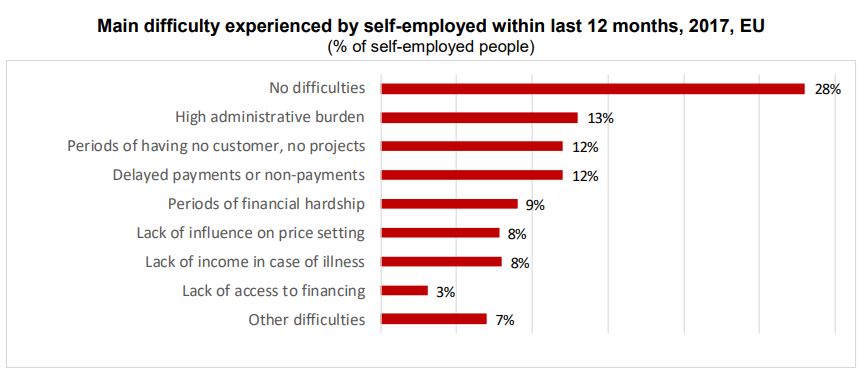More than 1 in 5 self-employed in the EU had seized a suitable opportunity to run their own business
Around 30% of self-employed reported no difficulties in their work
In 2017, in the European Union (EU), there were more than 228 million employed people, and about 33 million of them were self-employed. Self-employed people in the EU reported several reasons for becoming self-employed in the current job: suitable opportunity (23%), continuation of the family business (16%), usual practice in the field (15%), flexible work hours (11%), no job found as employee (11%) and request by former employer (2%).
There is a slight difference with regard to reasons to become self-employed reported by male and female self-employed in the EU. More women than men followed the usual practice in the field (16% of female self-employed vs 14% male self-employed) and more women than men opted for flexible work hours (14% vs 10%).
As the main difficulties, the self-employed report high administrative burden (13%) and periods of having no customer, no assignments or projects to work on (12%), delayed payments or non-payments (12%), periods of financial hardship (9%), lack of influence on price settings (8%) and lack of income in case of illness (8%). Almost one third of them reported not facing difficulties (28%).
In 2017, in the EU, 77% of the self-employed had two and more clients where none was dominant, 18% of self-employed people in the EU depended on a dominant client and 4% had no client in the last 12 months.

Starting a business as a response to suitable opportunity prevails in most countries, with thehighest share in Bulgaria, Italy and Hungary
In fifteen EU Member States, “suitable opportunity” was most frequently mentioned as the reason for becomin gself-employed, with the largest share in Bulgaria (42%), Italy (39%) and Hungary (36%). In three countries -Belgium (28%), Germany (21%) and Latvia (20%) – the most frequent reason was “usual practice in the field”.In another three – Poland (27%), Greece (25%) and Spain (24%) – “continuation of family business” was predominant. “No job found as an employee” was noted as the most frequent reason in Romania (38%) andCyprus (25%). In five countries – Austria (40%), Denmark (35%), the United Kingdom (27%), Luxembourg andFrance (both 26%) – the self-employed wanted to run their own business for “other reason”.

More than 40% of self-employed in Czechia, the Netherlands and the United Kingdom reported no difficulties in their work
In the EU, 28% of the self-employed reported facing no difficulties working as self-employed in the last 12 months.

In twenty-four EU Member States, “no difficulty” was most frequently mentioned as experienced when self-employed,with the largest share in Czechia (44%), the Netherlands (42%), the United Kingdom (41%), Swedenand Germany (both 40%). In three countries – Estonia (30%), Cyprus (24%) and Greece (23%) – the most often mentioned burden was “periods of financial hardship”. In Italy (26%), the main reported difficulty was ”high administrative burden”.
The share of self-employed not depending on a dominant client largest in Croatia, smallest in Hungary
In the EU, more than 4 in 5 self-employed do not depend on a dominant client. In all EU Member States, the share of self-employed not depending on a dominant client is higher than 60%. Thirteen countries are above the EU average (82%), with the largest share in Croatia (91%), Romania (88%), Spain and Belgium (both 87%).Hungary recorded the smallest share of self-employed not depending on a dominant client (67%). Some self-employed reported having had no clients in the last 12 months: at the EU level the share is 4% while the largest share of self-employed serving no client in the last 12 months were observed in Latvia and Romania (both 18%).
Geographical information
The European Union (EU) includes Belgium, Bulgaria, Czechia, Denmark, Germany, Estonia, Ireland, Greece,Spain, France, Croatia, Italy, Cyprus, Latvia, Lithuania, Luxembourg, Hungary, Malta, the Netherlands, Austria, Poland, Portugal, Romania, Slovenia, Slovakia, Finland, Sweden and the United Kingdom.
Methods and definitions
The European Labour Force Survey (LFS) is a large sample survey among private house holds in Europe and an important source for European statistics about the situation and trends in the EU labour market. The topic of the2017 ad hoc module was self-employment. The European Labour Force Survey (LFS) samples from the usual resident population. This means that newly arrived migrants and migrants who stay less than one year are normally not captured by the survey.
These selected findings, issued by Eurostat, the statistical office of the European Union, come from aspecial data collection from the 2017 European Labour Force Survey ad hoc module on self-employment, presented in a Statistics Explained article.
For more information
Eurostat database on LFS ad hoc module on self-employment
Eurostat Statistics Explained article on self-employment in 2017